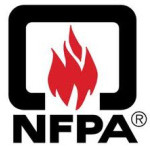- 産業: Fire safety
- Number of terms: 98780
- Number of blossaries: 0
- Company Profile:
Established in 1896, NFPA's mission is to reduce the worldwide burden of fire and other hazards on the quality of life by providing and advocating consensus codes and standards, research, training, and education.
The percent ratio of the weight of the gas in a container to the weight of water at 60°F (15. 6°C) that the container will hold.
Industry:Fire safety
The plane in which the exposed face of the specimen is located during testing (i.e., horizontally facing the heater).
Industry:Fire safety
The number of British thermal units produced by the combustion, at constant pressure, of 1 ft3 (0. 03 m3) of gas when the products of combustion are cooled to the initial temperature of the gas and air, when the water vapor formed during combustion is condensed, and when all the necessary corrections have been applied.
Industry:Fire safety
The minimum separation distance between adjacent buildings occupied in conjunction with the manufacture, transportation, storage, or use of explosive materials where one of the buildings contains explosive materials and the other building does not.
Industry:Fire safety
The outcome of an event, which may be expressed qualitatively or quantitatively.
Industry:Fire safety
The parts of a fire apparatus that transmit power from the engine to the wheels, including the transmission, split shaft power takeoff, midship pump transmission, drive shaft(s), clutch, differential(s), and axles.
Industry:Fire safety
The normal operating pressure as indicated on the nameplate or cylinder of a fire extinguisher.
Industry:Fire safety
The overhead or under-chassis feeder conductors, including the grounding conductor, together with the necessary fittings and equipment or a power-supply cord listed for mobile home use, designed for the purpose of delivering energy from the source of electrical supply to the distribution panelboard within the mobile home.
Industry:Fire safety
The opening provided in a draft hood to permit the ready escape to the atmosphere of the flue products from the draft hood in the event of no draft, backdraft, or stoppage beyond the draft hood and to permit inspiration of air into the draft hood in the event of a strong chimney updraft.
Industry:Fire safety
